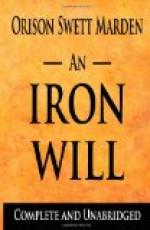Ben Jonson, when following his trade of a mason, worked on Lincoln’s Inn in London with trowel in hand and a book in his pocket. Joseph Hunter was a carpenter in youth, Robert Burns a plowman, Keats a druggist, Thomas Carlyle and Hugh Miller masons. Dante and Descartes were soldiers. Cardinal Wolsey, Defoe, and Kirke White were butchers’ sons. Faraday was the son of a hostler, and his teacher, Humphry Davy, was an apprentice to an apothecary. Kepler was a waiter boy in a German hotel, Bunyan a tinker, Copernicus the son of a Polish baker. They rose by being greater than their callings, as Arkwright rose above mere barbering, Bunyan above tinkering, Wilson above shoemaking, Lincoln above rail-splitting, and Grant above tanning. By being first-class barbers, tinkers, shoemakers, rail-splitters, tanners, they acquired the power which enabled them to become great inventors, authors, statesmen, generals. John Kay, the inventor of the fly-shuttle, James Hargreaves, who introduced the spinning-jenny, and Samuel Compton, who originated mule-spinning, were all artisans, uneducated and poor, but were endowed with natural faculties which enabled them to make a more enduring impression upon the world than anything that could have been done by the mere power of scholarship or wealth.
It cannot be said of any of these great names that their individual courses in life would have been what they were, had there been lacking a superb will power resistless as the tide to bear them upward and onward.
Let Fortune empty her whole quiver on me, I have a soul that, like an ample shield, Can take in all, and verge enough for more; Fate was not mine, nor am I Fate’s: Souls know no conquerors. Dryden.
CHAPTER VI.
STAYING POWER.
“Never give up,
there are chances and changes,
Helping
the hopeful, a hundred to one;
And, through the chaos,
High Wisdom arranges
Ever success,
if you’ll only hold on.
Never give up; for the
wisest is boldest,
Knowing
that Providence mingles the cup,
And of all maxims, the
best, as the oldest,
Is the stern
watchword of ‘Never give up!’”
Be firm;
one constant element of luck
Is genuine,
solid, old Teutonic pluck.
Holmes.
Success in most things depends on knowing
how long it takes to
succeed.—Montesquieu.
The power to hold on is characteristic of all men who have accomplished anything great; they may lack in some other particular, have many weaknesses or eccentricities, but the quality of persistence is never absent from a successful man. No matter what opposition he meets or what discouragement overtakes him, drudgery cannot disgust him, obstacles cannot discourage him, labor cannot weary him; misfortune, sorrow, and reverses cannot harm him. It is not so much brilliancy of intellect, or fertility of resource, as persistency of effort, constancy of purpose, that makes a great man. Those who succeed in life are the men and women who keep everlastingly at it, who do not believe themselves geniuses, but who know that if they ever accomplish anything they must do it by determined and persistent industry.




